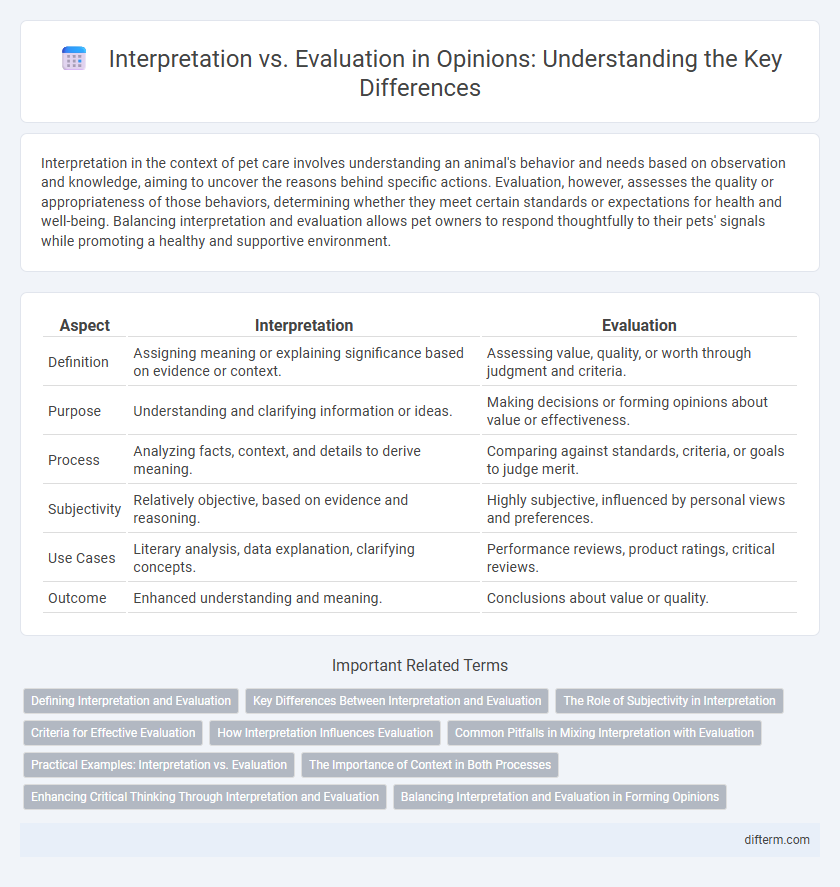Interpretation in the context of pet care involves understanding an animal's behavior and needs based on observation and knowledge, aiming to uncover the reasons behind specific actions. Evaluation, however, assesses the quality or appropriateness of those behaviors, determining whether they meet certain standards or expectations for health and well-being. Balancing interpretation and evaluation allows pet owners to respond thoughtfully to their pets' signals while promoting a healthy and supportive environment.
Table of Comparison
| Aspect | Interpretation | Evaluation |
|---|---|---|
| Definition | Assigning meaning or explaining significance based on evidence or context. | Assessing value, quality, or worth through judgment and criteria. |
| Purpose | Understanding and clarifying information or ideas. | Making decisions or forming opinions about value or effectiveness. |
| Process | Analyzing facts, context, and details to derive meaning. | Comparing against standards, criteria, or goals to judge merit. |
| Subjectivity | Relatively objective, based on evidence and reasoning. | Highly subjective, influenced by personal views and preferences. |
| Use Cases | Literary analysis, data explanation, clarifying concepts. | Performance reviews, product ratings, critical reviews. |
| Outcome | Enhanced understanding and meaning. | Conclusions about value or quality. |
Defining Interpretation and Evaluation
Interpretation involves explaining the meaning or significance of information, emphasizing understanding context and underlying messages. Evaluation centers on making judgments about the value, quality, or effectiveness based on criteria and evidence. Both processes require critical thinking but serve distinct purposes in analyzing content.
Key Differences Between Interpretation and Evaluation
Interpretation involves uncovering meaning, understanding context, and clarifying the significance of a subject, while evaluation assesses its value, quality, or effectiveness based on specific criteria. Interpretation is descriptive, focusing on what something signifies or represents, whereas evaluation is judgmental, determining worth or merit. Key differences include the purpose, with interpretation seeking comprehension and evaluation aiming at decision-making or forming an opinion.
The Role of Subjectivity in Interpretation
Interpretation hinges on subjective perception, shaping meaning based on individual experiences, cultural background, and emotional response. Unlike evaluation, which aims for measurable judgments, interpretation embraces ambiguity and personal insight as essential elements. This subjectivity enriches understanding by allowing diverse, multifaceted perspectives to coexist within a single work or idea.
Criteria for Effective Evaluation
Effective evaluation requires clear, relevant criteria that align with the purpose and context of the subject being assessed. Criteria must be measurable, specific, and objective to provide a fair analysis that distinguishes evaluation from mere interpretation. Consistent application of these standards ensures evaluations yield actionable insights rather than subjective opinions.
How Interpretation Influences Evaluation
Interpretation shapes evaluation by framing how information is understood and assigned meaning, directly impacting subsequent judgments. Cognitive biases and contextual factors during interpretation alter evaluative outcomes, underscoring the subjective nature of assessment. Accurate interpretation ensures evaluations reflect deeper insights rather than surface-level reactions, enhancing decision quality.
Common Pitfalls in Mixing Interpretation with Evaluation
Confusing interpretation with evaluation often leads to biased conclusions that hinder objective understanding. Interpretation involves explaining the meaning of information, while evaluation judges its value or quality, and mixing these can distort factual analysis. Recognizing this distinction prevents common pitfalls like subjective bias and unsupported assertions in critical thinking.
Practical Examples: Interpretation vs. Evaluation
Interpretation involves analyzing the meaning or significance of a piece of information, such as decoding a poem's symbolism or understanding statistical data trends. Evaluation requires making a judgment about the value or quality, like assessing the reliability of a news source or rating a product's effectiveness based on user reviews. Practical examples reveal that interpretation explains what something means, while evaluation determines its worth or impact.
The Importance of Context in Both Processes
Interpretation and evaluation hinge significantly on context, as the meaning and value assigned to any subject depend heavily on situational factors and background information. Without understanding the cultural, historical, or situational context, interpretation may lead to misrepresentation, and evaluation can become biased or irrelevant. Context provides the framework that guides accurate comprehension and fair judgment in both processes.
Enhancing Critical Thinking Through Interpretation and Evaluation
Enhancing critical thinking relies on mastering both interpretation and evaluation, where interpretation involves accurately understanding the meaning behind information, and evaluation assesses its credibility and relevance. Developing skills in recognizing biases, context, and underlying assumptions sharpens the ability to discern valid arguments from flawed reasoning. Critical thinkers who effectively integrate interpretation with evaluation can make informed decisions and foster deeper analytical insights across diverse disciplines.
Balancing Interpretation and Evaluation in Forming Opinions
Balancing interpretation and evaluation is crucial in forming well-rounded opinions that reflect both understanding and judgment. Interpretation involves comprehending meanings and contexts, while evaluation assesses the significance and quality based on criteria or values. Integrating these processes ensures opinions are informed, nuanced, and grounded in critical thinking rather than bias or superficial analysis.
interpretation vs evaluation Infographic

 difterm.com
difterm.com